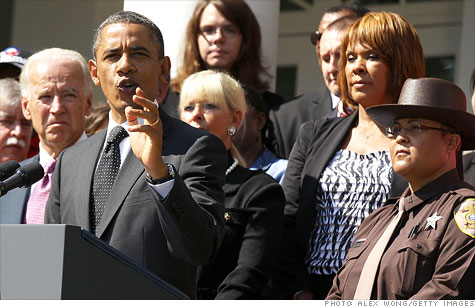Search News

President Obama proposes paying for his stimulus package primarily by raising more revenue from high-income households.
NEW YORK (CNNMoney) -- President Obama proposed Monday to pay for his $447 billion stimulus package largely by taxing the rich more.
Obama's largest proposed pay-for -- which the White House estimates would raise roughly $400 billion over 10 years -- would limit itemized deductions and certain other exemptions for individuals with adjusted gross incomes of $200,000 or more ($250,000 and up for married couples).
The tax measure would go into effect on Jan. 1, 2013, when the White House assumes the top two income tax rates would revert to 36% and 39.6%, up from the current 33% and 35% as a result of the Bush-era tax cuts.
Obama's proposal would cap itemized deductions at 28%. That would mean for every $100 in deductions the rich claim in 2013, they would be able to reduce their tax bill by only $28. That would be less than the $36 or $39.60 they would get if they are in the top two tax brackets.
Relative to other federal tax filers, high-income households benefit disproportionately from itemized deductions -- including those for mortgage interest and charitable contributions.
Obama's plan is similar to one he offered in each of his three budgets. But the proposal has gone nowhere in Congress.
The president put forth other repeat proposals on Monday to pay for the stimulus package.
So-called carried interest -- a portion of the money paid to managers of hedge funds and other investments partnerships -- would be taxed as ordinary income under Obama. Translation: It would be subject to rates as high as 39.6%, up from the current preferential rate of 15%. The White House estimates this change could raise $18 billion over 10 years.
Obama also wants to repeal various oil subsidies for an estimated savings of $40 billion. And he would impose a less-generous depreciation rule for the purchase of corporate jets. That measure would raise an estimated $3 billion.
All told, the pay-for proposals would raise roughly $467 billion, White House budget director Jacob Lew told reporters.
Lew noted that the White House measures "intentionally overachieve" on savings to compensate for likely differences in estimates that will be made by the Congressional Budget Office, which is the official cost-and-savings arbiter for Congress.
"We've built in a cushion for the differences that happen," Lew said.
The president's pay-for proposals will likely meet with stiff opposition from Republicans. Many GOP lawmakers don't want to raise taxes on anyone and aren't keen on the president's jobs plan to begin with, even though it contains more than $200 billion in tax cuts.
And at a time when Congress' debt super committee is working to cut deficits by at least $1.2 trillion over 10 years, Obama's pay-for plan would reduce the committee's revenue-raising options.
On the other hand, many career deficit hawks support measures to spur the economy now, so long as they are paid for eventually and paired with a long-term debt reduction plan. ![]()
| Overnight Avg Rate | Latest | Change | Last Week |
|---|---|---|---|
| 30 yr fixed | 3.80% | 3.88% | |
| 15 yr fixed | 3.20% | 3.23% | |
| 5/1 ARM | 3.84% | 3.88% | |
| 30 yr refi | 3.82% | 3.93% | |
| 15 yr refi | 3.20% | 3.23% |
Today's featured rates:
| Latest Report | Next Update |
|---|---|
| Home prices | Aug 28 |
| Consumer confidence | Aug 28 |
| GDP | Aug 29 |
| Manufacturing (ISM) | Sept 4 |
| Jobs | Sept 7 |
| Inflation (CPI) | Sept 14 |
| Retail sales | Sept 14 |